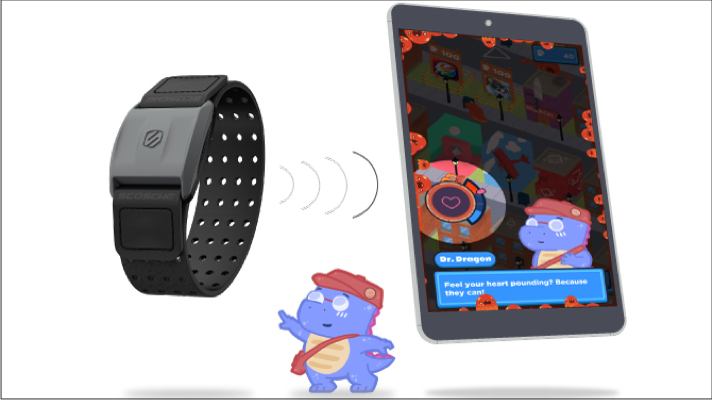
Boston Children’s spinout Mightier, which makes biofeedback games to help children improve their emotional resilience, has raised $6.6 million in Series A funding, bringing the company’s total funding to $10.1 million.
Foxkiser led the round, with additional contributions from new investors Asset Management Ventures and FundRx, and existing investors including Founder Collective, Slow Ventures and Project 11.
WHAT THEY DO
Mightier offers 25 bioresponsive mobile games, as well as a heart rate monitor (the Mightier Band). The games are designed by popular mobile game developers, but they’re designed to both teach and test emotional regulation skills like deep breathing and visualization. Success at emotional regulation is tied to success in the game.
“While you’re playing a game, eventually you’re going to come to a situation that’s hard for you and that’s going to push your heart rate up, or more formally it’s going to push your autonomic response up,” cofounder and Chief Scientific Officer Jason Kahn told MobiHealthNews last year. “Once that happens we do this counterintuitive thing of making the game harder. And that, for kids, is intentionally frustrating. So now they are in this space where the game has gotten harder and they have to find a way to back out to make the game easier again.”
The company offers the platform directly to families in two different packages, one of which includes a tablet and monthly coaching sessions with a licensed clinician.
WHAT IT’S FOR
The company, which grew out of technology developed and tested at Boston Children’s Hospital and Harvard Medical School, is raising money to expand its team, specifically in the areas of product development, marketing and engineering.
Mightier reports that its consumer base has grown more than tenfold in the last six months, and that more than 3,000 families have used the platform to date.
MARKET SNAPSHOT
While the particulars of Mightier’s approach are unique, the idea of video games to improve children’s health, and even biofeedback video games, has cropped up in a few different areas over the years.
A 2017 clinical trial showed that a biofeedback game had potential in treating ADHD. In the game, from developer NeuroPlus, children wear an EEG monitor and additional sensors that measure movement and muscle tension. The readings from those sensors actually control the game — in one game, the player rides a dragon that speeds up the more they focus and slows down when their attention wanders.
Akili, one of the leading digital therapeutics companies, is also focusing on ADHD via a game for kids called Project EVO, though it currently has no biofeedback component.
For adults, non-gamified biofeedback has shown some promise, with the Department of Defense investigating the technology back in 2013.
ON THE RECORD
“We are beyond excited to be partnering with new investors who believe in our mission and can help us grow,” Craig Lund, cofounder and CEO of Mightier, said in a statement. “We created Mightier to empower kids to overcome the emotional challenges they face every day. This investment will help us reach even more families. Every day we hear from parents that their kids are struggling to engage with traditional methods, like talk therapy, to learn self-regulation. Mightier empowers kids to practice calming skills in their moments of need so they automatically respond differently in life.”



















